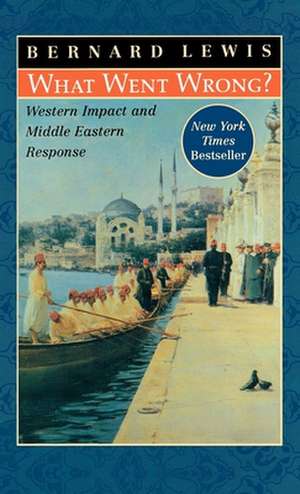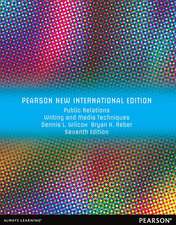What Went Wrong?: Western Impact and Middle Eastern Response
Autor Bernard W. Lewisen Limba Engleză Hardback – 31 dec 2001
In this intriguing volume, Bernard Lewis examines the anguished reaction of the Islamic world as it tried to understand why things had changed--how they had been overtaken, overshadowed, and to an increasing extent dominated by the West. Lewis provides a fascinating portrait of a culture in turmoil. He shows how the Middle East turned its attention to understanding European weaponry and military tactics, commerce and industry, government and diplomacy, education and culture. Lewis highlights the striking differences between the Western and Middle Eastern cultures from the 18th to the 20th centuries through thought-provoking comparisons of such things as Christianity and Islam, music and the arts, the position of women, secularism and the civil society, the clock and the calendar.
Hailed in The New York Times Book Review as "the doyen of Middle Eastern studies," Bernard Lewis is one of the West's foremost authorities on Islamic history and culture. In this striking volume, he offers an incisive look at the historical relationship between the Middle East and Europe.
Preț: 350.82 lei
Nou
Puncte Express: 526
Preț estimativ în valută:
67.15€ • 72.97$ • 56.44£
67.15€ • 72.97$ • 56.44£
Carte tipărită la comandă
Livrare economică 21 aprilie-05 mai
Preluare comenzi: 021 569.72.76
Specificații
ISBN-13: 9780195144208
ISBN-10: 0195144201
Pagini: 192
Dimensiuni: 147 x 218 x 21 mm
Greutate: 0.38 kg
Editura: Oxford University Press
Colecția Oxford University Press USA
Locul publicării:Oxford, England, United States
ISBN-10: 0195144201
Pagini: 192
Dimensiuni: 147 x 218 x 21 mm
Greutate: 0.38 kg
Editura: Oxford University Press
Colecția Oxford University Press USA
Locul publicării:Oxford, England, United States
Recenzii
"Arguably the West's most distinguished scholar on the Middle East."--Newsweek
"Lewis has done us all--Muslim and non-Muslim alike--a remarkable service.... The book's great strength, and its claim upon our attention, [is that] it offers a long view in the midst of so much short-term and confusing punditry on television, in the op-ed pages, on campuses and in strategic studies
think tanks." --Paul Kennedy, The New York Times Book Review
"When it comes to Islamic studies, Bernard Lewis is the father of us all. With brilliance, integrity, and extraordinary mastery of languages and sources, he has led the way for Jewish and Christian investigators seeking to understand the Muslim world."--National Review
"A timely and provocative contribution to the current raging debate about the tensions between the West and the Islamic world.... One wishes leaders in the Islamic world would pay heed to some of Lewis' themes." --Stanley Reed, Business Week
"A sobering picture, delivered with persuasive detail and respect. Bernard Lewis comes not to bury Islam, but to praise what it once was--and might be again."--Carlin Romano, Philadelphia Inquirer
"Lucidly argued and richly supported by telling quotations.... Lewis is a persuasive chronicler of Muslim resistance to change and modernity."--Robert Irwin, Washington Post Book World
"An accessible and excitingly knowledgeable antidote to today's natural sense of befuddlement." --Michael Pakenham, Baltimore Sun
"Replete with the exceptional historical insight that one has come to expect from the world's foremost Islamic scholar." --Karen Elliott House, Wall Street Journal
"A provocative and suggestive review of Islamicresponse to ideas and practices of the Christian West.... Lewis has given us a thoughtful treatment of the historical backdrop of the Sept. 11 tragedy." --Fritz Lanham, Houston Chronicle
"A compelling book. One of our most distinguished historians throws a floodlight on that cruel divide between the West and the societies of Islam. Learned and urgent at the same time." --Fouad Ajami, The Johns Hopkins University
"Lewis has done us all--Muslim and non-Muslim alike--a remarkable service.... The book's great strength, and its claim upon our attention, [is that] it offers a long view in the midst of so much short-term and confusing punditry on television, in the op-ed pages, on campuses and in strategic studies
think tanks." --Paul Kennedy, The New York Times Book Review
"When it comes to Islamic studies, Bernard Lewis is the father of us all. With brilliance, integrity, and extraordinary mastery of languages and sources, he has led the way for Jewish and Christian investigators seeking to understand the Muslim world."--National Review
"A timely and provocative contribution to the current raging debate about the tensions between the West and the Islamic world.... One wishes leaders in the Islamic world would pay heed to some of Lewis' themes." --Stanley Reed, Business Week
"A sobering picture, delivered with persuasive detail and respect. Bernard Lewis comes not to bury Islam, but to praise what it once was--and might be again."--Carlin Romano, Philadelphia Inquirer
"Lucidly argued and richly supported by telling quotations.... Lewis is a persuasive chronicler of Muslim resistance to change and modernity."--Robert Irwin, Washington Post Book World
"An accessible and excitingly knowledgeable antidote to today's natural sense of befuddlement." --Michael Pakenham, Baltimore Sun
"Replete with the exceptional historical insight that one has come to expect from the world's foremost Islamic scholar." --Karen Elliott House, Wall Street Journal
"A provocative and suggestive review of Islamicresponse to ideas and practices of the Christian West.... Lewis has given us a thoughtful treatment of the historical backdrop of the Sept. 11 tragedy." --Fritz Lanham, Houston Chronicle
"A compelling book. One of our most distinguished historians throws a floodlight on that cruel divide between the West and the societies of Islam. Learned and urgent at the same time." --Fouad Ajami, The Johns Hopkins University
Notă biografică
Bernard Lewis is the Cleveland E. Dodge Professor of Near Eastern Studies Emeritus at Princeton University. A highly eminent authority on Middle Eastern history, the author of over two dozen books, most notably The Arabs in History, The Emergence of Modern Turkey, The Political Language of Islam, The Muslim Discovery of Europe and The Middle East: A Brief History of the Last 2000 Years.
Descriere
For many centuries, the world of Islam was in the forefront of human achievement--the foremost military and economic power in the world, the leader in the arts and sciences of civilization. Christian Europe, a remote land beyond its northwestern frontier, was seen as an outer darkness of barbarism and unbelief from which there was nothing to learn or to fear. And then everything changed, as the previously despised West won victory after victory, first in the battlefield and the marketplace, then in almost every aspect of public and even private life.
In this intriguing volume, Bernard Lewis examines the anguished reaction of the Islamic world as it tried to understand why things had changed--how they had been overtaken, overshadowed, and to an increasing extent dominated by the West. Lewis provides a fascinating portrait of a culture in turmoil. He shows how the Middle East turned its attention to understanding European weaponry and military tactics, commerce and industry, government and diplomacy, education and culture. Lewis highlights the striking differences between the Western and Middle Eastern cultures from the 18th to the 20th centuries through thought-provoking comparisons of such things as Christianity and Islam, music and the arts, the position of women, secularism and the civil society, the clock and the calendar.
Hailed in The New York Times Book Review as "the doyen of Middle Eastern studies," Bernard Lewis is one of the West's foremost authorities on Islamic history and culture. In this striking volume, he offers an incisive look at the historical relationship between the Middle East and Europe.
In this intriguing volume, Bernard Lewis examines the anguished reaction of the Islamic world as it tried to understand why things had changed--how they had been overtaken, overshadowed, and to an increasing extent dominated by the West. Lewis provides a fascinating portrait of a culture in turmoil. He shows how the Middle East turned its attention to understanding European weaponry and military tactics, commerce and industry, government and diplomacy, education and culture. Lewis highlights the striking differences between the Western and Middle Eastern cultures from the 18th to the 20th centuries through thought-provoking comparisons of such things as Christianity and Islam, music and the arts, the position of women, secularism and the civil society, the clock and the calendar.
Hailed in The New York Times Book Review as "the doyen of Middle Eastern studies," Bernard Lewis is one of the West's foremost authorities on Islamic history and culture. In this striking volume, he offers an incisive look at the historical relationship between the Middle East and Europe.
















